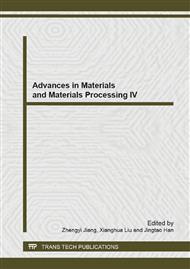p.797
p.801
p.805
p.809
p.814
p.819
p.824
p.830
p.838
Experimental Study of Compression and Carbonation in Concrete Subjected to Freeze-Thaw Environment
Abstract:
In order to research the changes of concrete properties in freeze-thaw environment, five concrete samples with water-cement ratio respectively equal to 0.60, 0.65, 0.70, 0.75 and 0.80 were tested in freeze-thaw environment according to GB/T50082-2009 concrete rapid freeze-thaw cycles test method. Five samples were carried out 0, 25, 50, 75, 100 times faster freeze-thaw cycles test. With the increasing number of freeze-thaw cycles, the concrete relative dynamic modulus of elasticity loss rises, the compressive strength drops, and the carbonation depth increases. The greater the water-cement ratio of concrete specimens with freeze-thaw cycles, the greater the degree of damage increases.
Info:
Periodical:
Pages:
814-818
Citation:
Online since:
February 2014
Authors:
Price:
Сopyright:
© 2014 Trans Tech Publications Ltd. All Rights Reserved
Share:
Citation:


